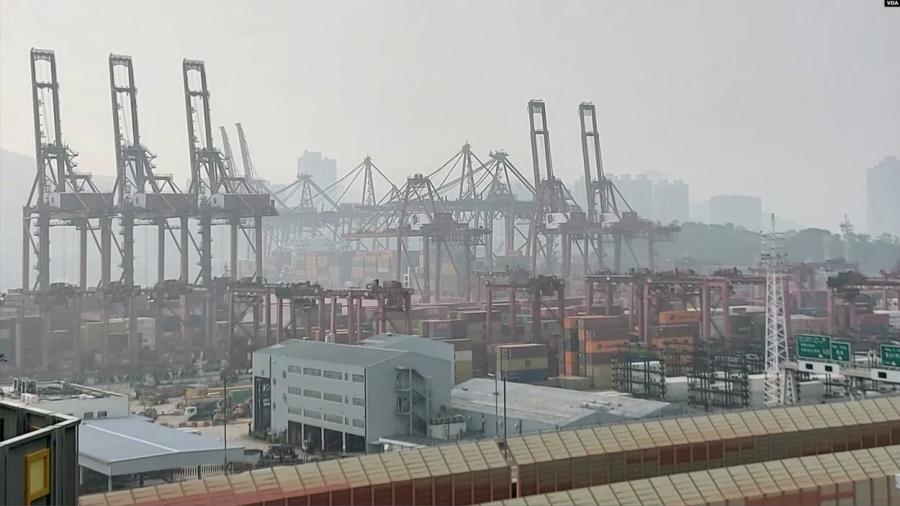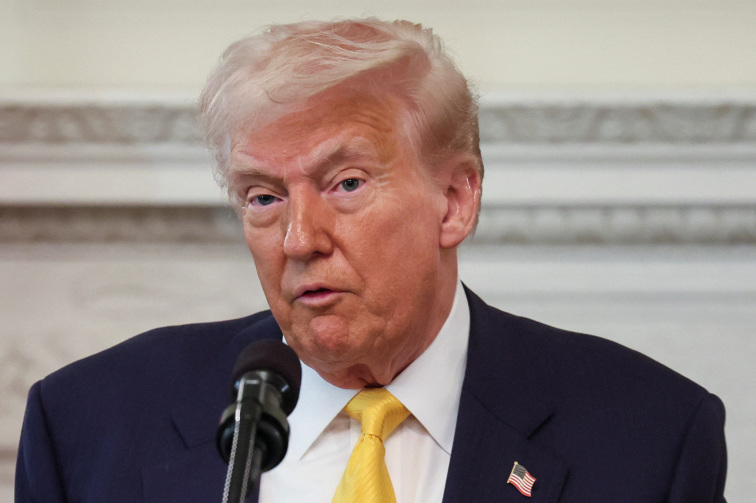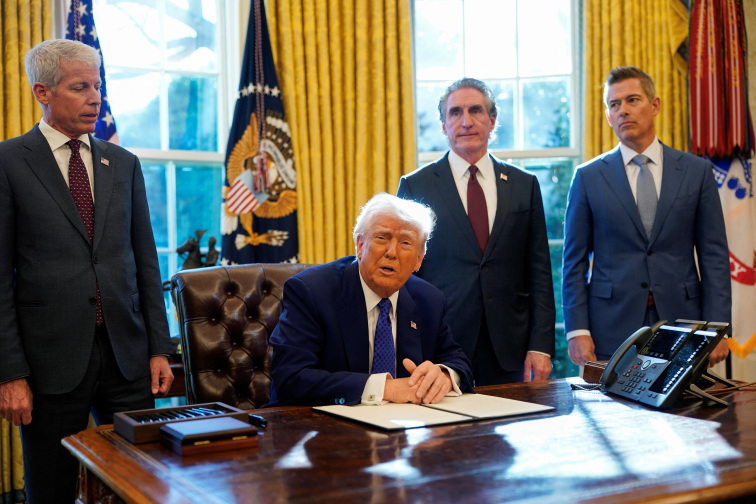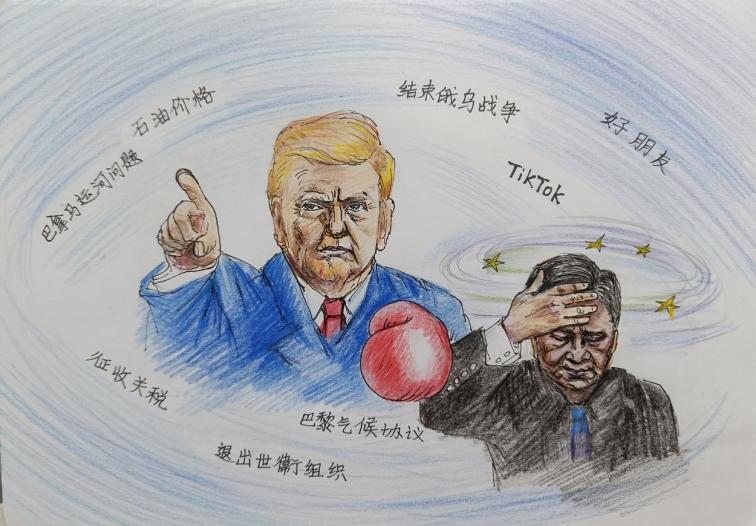February 16, 2025 – Kwai Tsing Container Terminal, Hong Kong. Once the busiest port in the world by throughput, it has fallen out of the global top ten rankings since 2023. (VOA)
[People News] When former U.S. President Donald Trump imposed tariffs on Chinese goods, he for the first time treated Hong Kong on equal footing with China. Scholars and experts familiar with the economic conditions of both China and Hong Kong believe this is a fatal blow to Hong Kong, impacting not only its short-term exports and economic growth but also causing it to lose its long-term competitive edge on the international stage.
According to Voice of America (VOA), the Trump administration announced that starting February 4, all Chinese products would be subject to an additional 10% tariff, and that these tariffs would also apply to goods from Hong Kong. At the same time, certain Hong Kong products valued at $800 or less would no longer enjoy "de minimis duty exemption" treatment, just like Chinese products.
Ross Feingold, a political risk consultant currently based in Taiwan, said he was not surprised by this decision. He noted that as early as 2019, during the Hong Kong anti-extradition protests, the U.S. had already deemed Hong Kong indistinguishable from mainland China.
He stated: "Since the 2019 anti-extradition movement, the U.S. has not considered Hong Kong as separate from mainland China. Hong Kong and China being subjected to the same tariffs is something that will not change. U.S. lawmakers and Trump have already made this decision, and they do not see Hong Kong as an independent entity. This is also a political decision. I believe this stance will not change in the medium to long term."
During Trump’s first term in 2020, Washington revised the Hong Kong Policy Act in response to Beijing’s implementation of the Hong Kong National Security Law, issuing an Executive Order on Hong Kong Normalization that revoked Hong Kong’s special independent customs status. The U.S. Customs and Border Protection even mandated that Hong Kong-made products could no longer be labeled as "Made in Hong Kong." However, at the time, additional tariffs were not immediately imposed on Hong Kong goods. This time, however, the U.S. government has officially equated Hong Kong with China in terms of tariffs.
U.S. Tariffs on China Deal Multiple Blows to Hong Kong
Following the U.S. tariff increase, the Hong Kong Trade Development Council (HKTDC) immediately revised its 2025 export growth forecast downward from 4% to 3.5%. The council estimated that the new tariffs would affect approximately HK$15 billion worth of goods.
A trade and economic research report published by HKTDC in July 2024 noted that in 2023, the U.S. was Hong Kong’s second-largest export market, with total exports amounting to $34.9 billion. Telecommunications equipment and components accounted for the largest share (23%), followed by computers, pearls, and gemstones, each making up 9% of total exports.
Zhang Hongzhi, a semiconductor component exporter who has been in business in Hong Kong since 2006, said that while his sales had not been significantly impacted by the sluggish global economy, the U.S. tariff increase could pose a challenge in the near future.
"The global economy hasn’t been doing well since the pandemic, and my sales were already down by 10% last year. Although we don’t focus solely on exports to the U.S., these new tariffs will inevitably push up costs and prices," Zhang told Voice of America (VOA).
Zhang said his only option now is to seek more business opportunities in other countries to offset potential losses caused by the tariffs.
Some analysts argue that the immediate impact of the tariffs—reduced exports and slower economic growth—is just the beginning. The long-term concern is that treating Hong Kong the same as mainland China in trade policies will erode its international competitive edge.
Independent financial analyst Si Ling, who resides in Australia, told VOA: "This sends a clear message to the world that Hong Kong is no different from China. Conducting business in Hong Kong now offers no advantage over mainland China. Previously, Hong Kong enjoyed special trade benefits as an independent customs territory and was recognized as a trade partner by the U.S. State Department. If Trump’s tariff sanctions escalate, the U.S. Congress may further discuss revoking Hong Kong’s permanent most-favored-nation trade status, stripping it of its past advantages."
Former Hong Kong Cable TV Finance Channel Director Yan Baogang acknowledged that U.S. Secretary of State Marco Rubio’s remarks—stating that Hong Kong companies are essentially Chinese companies—are difficult to refute. He warned that this perception could severely impact Hong Kong’s status as an international financial center.
"When Beijing issues directives, Hong Kong companies have no choice but to comply. Now, even Hong Kong’s Cheung Kong Group’s investments in Panama are being classified as part of the CCP’s strategic investments. This damages Hong Kong’s corporate reputation internationally. If foreign investors start to reconsider their presence in Hong Kong, they may ask, ‘If Hong Kong is no different from mainland cities, why not invest directly in China instead?’ We’ve already seen this trend emerging, with some foreign businesses withdrawing from Hong Kong. This is far more damaging to Hong Kong’s trade and financial standing than the tariffs alone."
Yan further pointed out that even some pro-Beijing figures in Hong Kong, who have retired from politics, are now urging the city to rebuild its status as an international economic hub by reducing its political entanglements. He noted that Hong Kong’s decoupling from Western economies has been severe, yet local officials remain focused on national security, prioritizing political concerns over economic revival. This, he argued, is making it nearly impossible for Hong Kong to reestablish ties with Western countries—the only viable path to reversing its economic downturn.
China’s Export-Driven Growth Model Faces Collapse
Beyond Hong Kong, mainland China’s economy is also suffering from the U.S. tariff hikes. Si Ling believes China’s trade advantage in the U.S. will be significantly diminished.
"China’s entire export advantage could disappear, and its ability to dump cheap goods into the U.S. market will be severely restricted. This could shake the dominance of low-cost Chinese products in the American market," he explained.
Si Ling added that if China loses its export edge, Beijing’s strategy of using exports to drive economic growth will likely collapse. He warned that the Trump administration is only just beginning its trade actions against China, and future sanctions will likely be even harsher.
In response to the U.S. tariff hikes, the Chinese government has announced countermeasures, including a 15% border tax on U.S. coal and liquefied natural gas, as well as a 10% tariff on American crude oil, agricultural machinery, and large-engine vehicles.
However, Yan Baogang believes Beijing’s retaliatory measures will have limited impact because some targeted industries are already restricted from entering China.
"China wants to leave room for negotiation, but at the same time, companies like Apple and Google face different realities. Apple might still have access to China, but Google, Meta, and Facebook are completely blocked. This means China has few effective ways to counter U.S. tariffs, and the actual impact on American companies may not be as severe as Beijing hopes," Yan concluded.











News magazine bootstrap themes!
I like this themes, fast loading and look profesional
Thank you Carlos!
You're welcome!
Please support me with give positive rating!
Yes Sure!